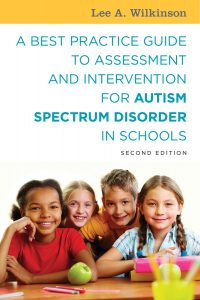The number of children identified with autism has more than doubled over the last decade. School-based professionals are now being asked to participate in the screening, assessment, and educational planning for children and youth on the spectrum more than at any other time in the recent past. Moreover, the call for greater use of evidence-based practice has increased demands that school personnel be prepared to recognize the presence of risk factors, engage in case finding, and be knowledgeable about “best practice” guidelines in assessment and intervention for autism spectrum disorder (ASD) to ensure that students are being identified and provided with the appropriate programs and services.
Best practice guidelines are developed using the best available research evidence in order to provide professionals with evidence-informed recommendations that support practice and guide practitioner decisions regarding assessment and intervention. Best practice requires the integration of professional expertise, each student’s unique strengths and needs, family values and preferences, and the best research evidence into the delivery of services. Professionals and families collaborate and work together as partners to prioritize domains of functioning for assessment and intervention planning. Best practices for school-based practitioners are best practices for students and their families.
There are several important best practice considerations that should inform the assessment and intervention process. For example, a developmental perspective is critically important. While the core symptoms of autism are present during early childhood, ASD is a lifelong condition that affects the individual’s adaptive functioning from childhood through adulthood. Utilizing a developmental assessment framework provides a yardstick for understanding the severity and quality of delays or atypicality. A comprehensive developmental assessment approach requires the use of multiple measures including, but not limited to, verbal reports, direct observation, direct interaction and evaluation, and third-party reports. Interviews and observation schedules, together with an interdisciplinary assessment of social behavior, language and communication, adaptive behavior, motor skills, sensory issues, atypical behaviors, and cognitive functioning are recommended best practice procedures. Assessment is a continuous process, rather than a series of separate actions, and procedures may overlap and take place in tandem. Supporting children and youth with ASD also requires individualized and effective intervention strategies. It is critical that teachers, administrators, and other school personnel have an understanding of those strategies with a strong evidence base and demonstrated effectiveness to adequately address the needs of students on the spectrum and to help minimize the gap between research and practice.
Despite the significant increase in the number of journal articles, book chapters, textbooks, and various publications outlining information regarding educational practices, supports that are reportedly effective for students on the spectrum, the existing literature can often be confusing and at times conflicting. As a result, there continues to be a need for an up-to-date resource that provides school-based professionals and allied practitioners with a best practice guide to screening, assessment and intervention that can be used easily and efficiently in their every day work.
 The award-winning book, A Best Practice Guide to Assessment and Intervention for Autism Spectrum Disorder in Schools, 2nd Edition, provides a practical and scientifically-based approach to identifying, assessing, and treating children and adolescents with an autism spectrum disorder (ASD) in school settings. Fully updated to reflect the DSM-5 and current assessment tools, procedures and research, this fully revised and expanded second edition will support school-based professionals in a number of key areas including:
The award-winning book, A Best Practice Guide to Assessment and Intervention for Autism Spectrum Disorder in Schools, 2nd Edition, provides a practical and scientifically-based approach to identifying, assessing, and treating children and adolescents with an autism spectrum disorder (ASD) in school settings. Fully updated to reflect the DSM-5 and current assessment tools, procedures and research, this fully revised and expanded second edition will support school-based professionals in a number of key areas including:
- Screening and assessing children on the spectrum
- Identifying evidence-based interventions and practices
- Developing and implementing comprehensive educational programs
- Providing family support and special needs advocacy
- Promoting special needs advocacy
Each chapter features a consolidated and integrative description of best practice assessment and intervention/treatment approaches for learners on the autism spectrum. Combining current research evidence with theory and best practice, the text brings the topics of assessment and intervention together in a single authoritative resource guide consistent with recent advances in evidence-based practice. Illustrative case examples, glossary of terms, and helpful checklists and forms make this the definitive resource for identifying and implementing interventions for school-age children and youth with ASD.
This award-winning guide is intended to meet the needs of professionals such as educational and school psychologists, counselors, speech/language pathologists, occupational therapists, social workers, administrators, and both general and special education teachers. Parents, advocates, and community-based professionals will also find this guide a valuable and informative resource.
Lee A. Wilkinson, PhD, is a nationally certified and licensed school psychologist, chartered psychologist, registered psychologist, and certified cognitive-behavioral therapist. He is an Associate Fellow of the British Psychological Society. He has published widely on the topic of autism spectrum disorders and is editor of a text in the American Psychological Association (APA) School Psychology Book Series, Autism Spectrum Disorder in Children and Adolescents: Evidence-Based Assessment and Intervention in Schools. His book, Overcoming Anxiety and Depression on the Autism Spectrum: A Self-Help Guide Using CBT, also published by JKP, was honored as an “Award-Winning Finalist in the “Health: Psychology/Mental Health” category of the 2016 Best Book Awards.”